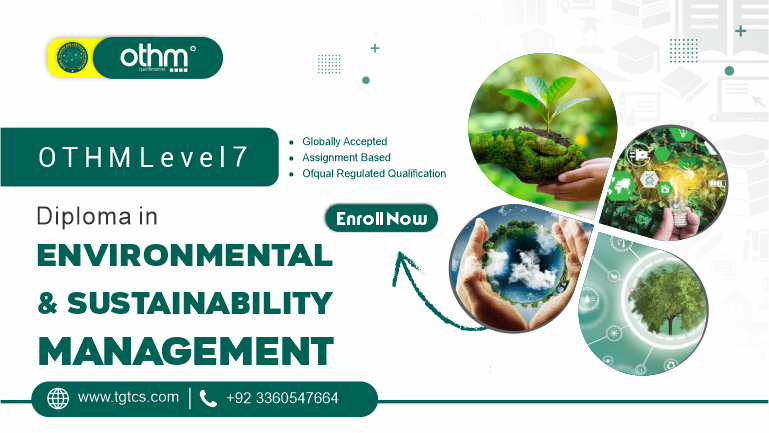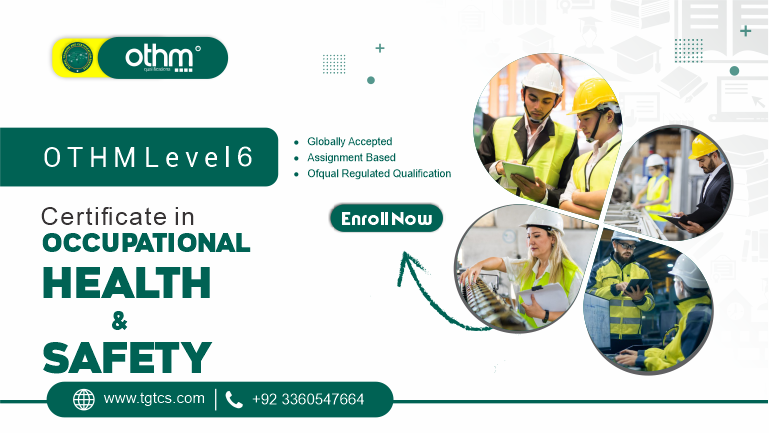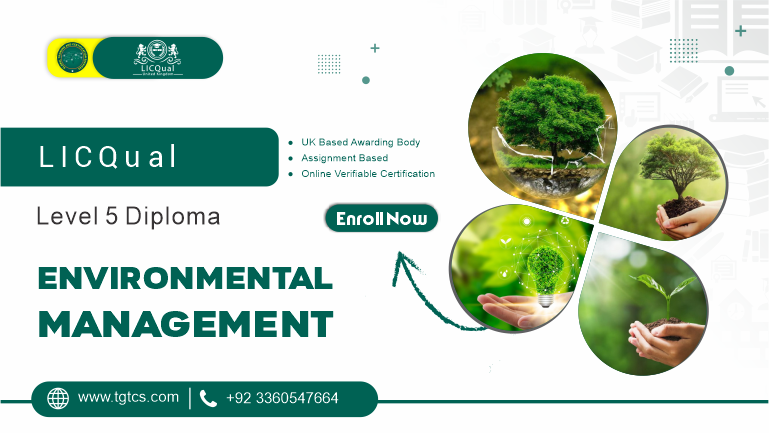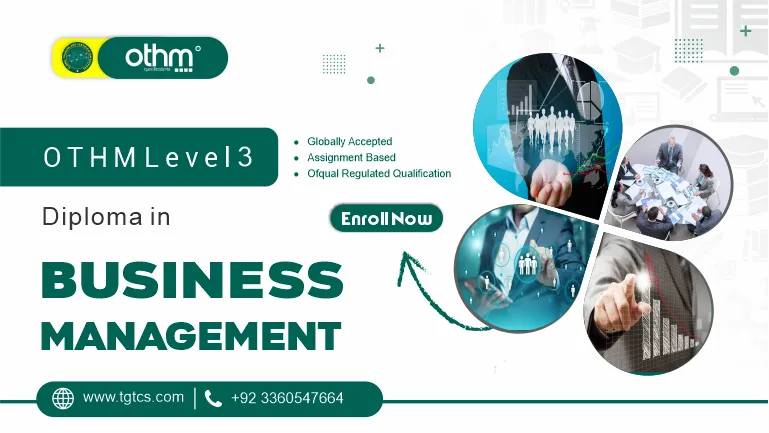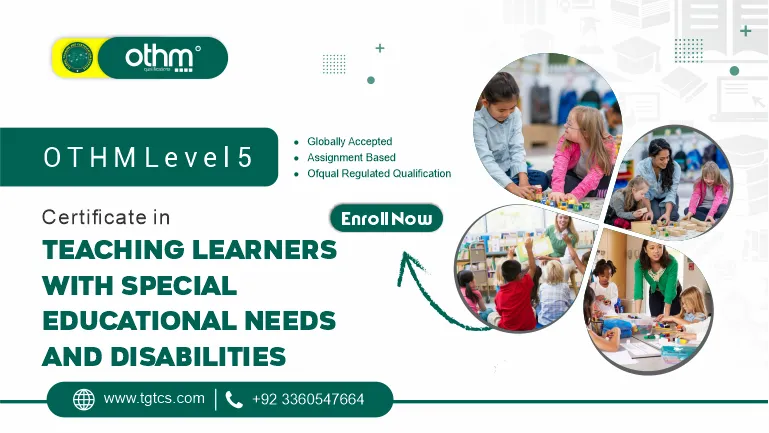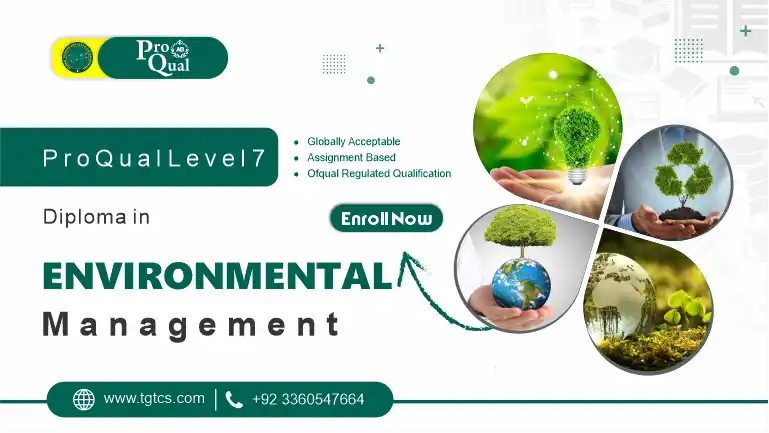OTHM Level 7 Diploma in Environmental and Sustainability Management
Do you envision a career where you can lead the charge in environmental conservation and sustainability efforts? If so, then the OTHM Level 7 Diploma in Environmental and Sustainability Management is your ticket to realizing those dreams.
The OTHM Level 7 Diploma in Environmental and Sustainability Management is an advanced qualification aimed at individuals seeking expertise in environmental and sustainability management.
This diploma program typically covers topics such as environmental policy development, sustainable resource management, climate change mitigation strategies, and sustainable business practices. It is suitable for professionals looking to enhance their understanding of environmental management principles and advance their careers in fields related to sustainability and environmental conservation.
Environmental concerns are at the forefront of global agendas. From climate change to resource depletion, the need for qualified professionals who can tackle these challenges head-on has never been greater. That’s where our diploma program steps in, offering you the opportunity to become a leader in the field of environmental and sustainability management.
Seize the opportunity to make a meaningful impact on the planet while advancing your career with the OTHM Level 7 Diploma in Environmental and Sustainability Management. Enroll today and take the first step toward a brighter, more sustainable future for generations to come.
OTHM Level 7 Diploma in Environmental and Sustainability Management offers a comprehensive education in addressing the environmental challenges of our time. By equipping learners with the necessary knowledge and skills.
Diploma in Environmental and Sustainability Management is a postgraduate qualification designed to provide learners with the knowledge and skills necessary to tackle environmental issues effectively. Accredited by Ofqual, the diploma is recognized globally and serves as a valuable asset for individuals seeking to advance their careers in environmental management or sustainability.
OTHM Level 7 Diploma in Environmental and Sustainability Management come into play, offering a comprehensive understanding of the principles and practices needed to address the complex challenges facing our planet.
There are several benefits associated with obtaining the OTHM Level 7 Diploma in Environmental and Sustainability Management:
- Enhanced Career Opportunities: Graduates of the program are well-equipped to pursue careers in a variety of fields, including environmental consultancy, sustainability management, corporate sustainability, and environmental policy development.
- Global Recognition: Being accredited by Ofqual, the diploma is recognized internationally, providing learners with opportunities to work in different parts of the world.
- Contribution to Environmental Sustainability: By acquiring the knowledge and skills to manage environmental issues effectively, graduates play a crucial role in promoting sustainability and mitigating the impacts of climate change.
- Networking Opportunities: Throughout the course, students have the opportunity to connect with industry professionals, guest speakers, and fellow learners, expanding their professional network and gaining valuable insights into the field.
Mandatory Units
- Fundamentals of Sustainability (20 Credits)
- Environmental Science and Energy Transition (20 Credits)
- Environmental Management in Organisations (20 Credits)
- Research Methods (20 Credits)
Optional Units
- Delivering Transformational Change (20 Credits)
- Advanced Principles of Net Zero (20 Credits)
- Environmental Politics and Policies (20 Credits)
- Sustainable Finance (20 Credits)
- Sustainability as a Business Strategy (20 Credits)
Fundamentals of Sustainability
- Understand the key concepts of sustainability and their relation to economic growth and development.
- Understand the context of sustainability and the reasons for urgent action, with a special focus on climate change and diversity. Understand the role of private enterprises and innovation in the transition to sustainability.
- Understand the need for global initiatives and treaties on sustainability and climate change.
- Understand the principles and perspectives of business ethics and its use in discussions regarding climate change and sustainability.
Environmental Science and Energy Transition
- Understand the physics of the energyrelated carbon cycle and its impact on temperature.
- Understand the physical principles ofharvesting renewable alternatives tofossil fuels and the technological andmarketdevelopments within this area.
- Understand the physical principles ofnon-renewable alternatives to fossil fuels,the political sensitivities of nonrenewables and the technological, andmarket developmentsrelated to thesesources of energy.
- Understand the dependence of alternative energy sources on storage and grid management.
- Understand the trilemma of energy transformation and the need for national policies and international cooperation.
Environmental Management in Organisations
- Understand topics relevant for environmental management and the reasons why organisations should choose to manage them.
- Understand environmental assessment and management tools and their advantages and disadvantages.
- Understand how to develop and deliver environmental performance improvement.
- Understand approaches collection,analysis, reporting and communication of environmental data.
Research Methods
- Be able to develop research approaches in a suitable context.
- Be able to critically review literature on a business research topic.Be able to design business research methodologies.
- Be able to develop a research proposal.
Delivering Transformational Change
- Understand how to conduct a materiality assessment to understand priorities for change and change readiness.
- Understand key techniques, practices,behaviours, and knowledge of change management.
- Understand the behaviour of complex systems and how to change them.
- Understand how a leader’s style and approach has a major impact on both team and individual performance, values,and motivations.
- Understand the meaning and purpose of ESG Governance Structure and how to develop it.
Advanced Principles of Net Zero
- Understand the meaning and importance of “net zero” at a conceptual level.
- Understand the application of the fundamentals of Greenhouse Gas (GHG) Accounting.
- Understand science-based targets and their facilitating role to deliver net zero.
- Understand how to communicate an organisation’s response to climate change, net zero pledges and green claims.
- Understand how and to which extent organisations and society can adapt to climate change.
Environmental Politics and Policies
- Understand principles and examples of environmental policy and legislation.
- Understand the role of ethics in international climate agreements and governance.
- Understand economic instruments available to effect change related to environmental and social issues.
- Understand suasive instruments available to effect change related to environmental and social issues.
- Understand key international agreements related to environmental governance and climate change politics.
- Understand the UN Sustainable Development Goals (SDG) and the importance of the sustainability agenda.
Sustainable Finance
- Understand the relevance of the Financial Industry to sustainability across different financial instruments and asset classes.
- Understand how physical and transition risks, particularly those related to climate change, translate to financial risks and how this is managed by financial organisations and entral banks.
- Understand sustainable / ESG financing strategies and products that facilitate sustainable transition and development.
- Understand the value and use of ESG ratings and labels.
Sustainability as a Business Strategy
- Understand the relationship between Economics and Sustainability and the four rationales of why sustainability is in businesses’ interest.
- Understand how sustainability impacts businesses’ value chain and how companies can capitalise on being sustainable.
- Understand the limitations of“traditional” accounting and the need to approach the concept of value holistically. Understand the concept of the circular economy, circular business models and the challenges related to operating and financing circular businesses.
- Understand the role of marketing and stakeholder engagement in the transition to sustainability and the risks of poormarketing practices.
The OTHM Level 7 Diploma is suitable for a wide range of professionals, including:
- Environmental managers and consultants
- Sustainability officers
- Corporate executives seeking to integrate sustainability into their business strategies
- Government officials involved in environmental policy-making
- Individuals looking to transition into careers focused on environmental and sustainability management
Course Overview
Course Level
Level 7
Course Units
4 mandatory Units
TQT
1200 hours
GLH
600 hours
Duration
6 to 12 Months
